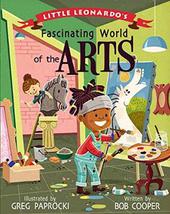
|
Little Leonardo's Fascinating World of the Arts
Board book
Main Details
| Title |
Little Leonardo's Fascinating World of the Arts
|
| Authors and Contributors |
By (author) Greg Paprocki
|
| Physical Properties |
| Format:Board book | | Pages:24 | | Dimensions(mm): Height 254,Width 203 |
|
| ISBN/Barcode |
9781423648734
|
| Classifications | Dewey:700.1 |
|---|
| Audience | |
|---|
| Illustrations |
colour illustrations throughout
|
|
Publishing Details |
| Publisher |
Gibbs M. Smith Inc
|
| Imprint |
Gibbs M. Smith Inc
|
| Publication Date |
13 March 2018 |
| Publication Country |
United States
|
Description
An introductory primer for kids learning about the "A" in "STEAM" : The Arts. Little Leonardo's Fascinating World of the Arts is a great way to encourage kids' interests in all manner of artistic pursuits that they might aspire to. This volume introduces children to the many different types of creative fields in the arts-including drawing and painting, music and dance, writing, design, architecture, and photography. This new series of books featuring illustrations by popular artist Greg Paprocki is the perfect way to encourage your brilliant child's interest in all facets of the educational STEAM curriculum: Science, Technology, Engineering, the Arts, and Mathematics. Every child will be enticed by the fun and surprising details revealed in Paprocki's cool and colorful artwork on every page.
Author Biography
Greg Paprocki works full-time as an illustrator and book designer. In addition to illustrating several Curious George books, he's provided illustrations for a number of books for Gibbs Smith, including A Is for Atom, S Is for Santa, B Is for Boo, and The Big Book of Superheroes. He began his career as an advertising art director after studying fine art and graphic design at the University of Nebraska. Bob Cooper has been an editor for more than 20 years, working with everything from comic books to legal briefs. He lives near Salt Lake City.
ReviewsThis colorful book shows very young children what art is and what different kinds of artists do. The author begins by listing several kinds of art as they appear in our lives, then describes historical art forms, such as cave painting and pottery design. Next, entire pages and spreads feature particular forms of art, artists, and materials, including sculpture, writing, drama, graphic design, architecture, and music. The role of computers in the creation of art today is mentioned, and readers are encouraged to imagine themselves as artists. The cartoon-style pictures show cheerful, ethnically diverse children in mainstream American settings creating art that often mirrors well-known pieces and styles of the Western tradition. A jazz band is included on the music page. An author's note at the end of the book introduces six great artists of the past; three of these are women, but five of the six are white. While children throughout the book are representative of America's diversity, readers will have to look elsewhere for inclusion of diverse contributions to the world of art. Volumes on math and science are similarly formulated but wordier. A page on anthropology in the science volume assumes a cultural perspective that all readers may not share. For the dedicated nonfiction fan, this picture dictionary introduces media that are better experienced than described. --Kirkus "Kirkus Reviews" (12/21/2017 12:00:00 AM)
|